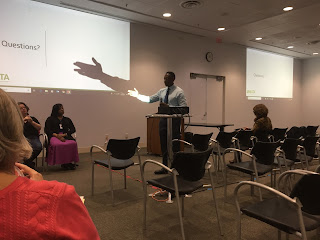The Specialized Transportation Advisory Committee struggles for representation
By Allison Donald
The
Specialized Transportation Advisory Committee (STAC) met for its first official
meeting of 2020. As a committee we continue
to work to assist MATA in identifying issues that negatively impact the
customer experience. This year we are
pushing for a dedicated funding to improve public transportation as a
whole. In addition, STAC is continuing
to offer suggestions to improve MATAplus service and calling for more
accountability on the MATAplus side.
Mr.
Amos the ADA Compliance Officer for MATA mentioned that the lack of a dedicated
funding source continues to hurt the frequency and quality service MATAplus
provides. Bobbie Fields STAC co-chair
and Mr. Amos, suggested that we start a letter writing campaign to keep the
conversation of securing dedicated funding going. As a committee we are pushing toward public
transit that is adequate and inclusive of all.
“If
Memphis wants to thrive we must invest in public transit,” said Allison Donald
STAC secretary, “and Memphians living with disabilities must be included in
shaping that vision.”
STAC
continues to push for improvements with the current service. Stephen Tennial, the interim chair, supports
the idea of extra vehicles being rolled out at the beginning of the month which
would be dedicated to those individuals working or going to school. STAC also
would like to do a survey of MATAplus that would take a look at the rider’s
experience. Both suggestions were just a
beginning to finding possible solutions for the ongoing issues with the area paratransit
service.
“If
we (MATA) were to do as suggested,” said Anthony Amos, “that would be ride
prioritization.”
Mr.
Amos pointed out that representatives from the FTA recently visited reviewed
the policies and procedures and found MATA not in violation of the ADA. The members of STAC called into question the “30
minute window rule” and whether MATA was stretching the interpretation in order
to maintain high on time performance numbers.
The
most contentious part of the meeting occurred when STAC asked for the policies
and procedures that govern the day-to-day operations of MATAplus.
Anthony
Amos expressed frustration about the course STAC has taken. He suggested that the committee is stagnant
and no longer is representative of the community of riders. As a result Mr. Amos wants to postpone the
March meeting. He stated he would like
to pick the time, place, and community representatives who will be attending
the next meeting.
There has not been a date set for the
next STAC meeting. When we are notified
we will be sure to get it out to the community.





